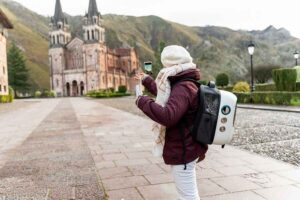AI isn’t just a futuristic concept anymore—it’s a daily reality. According to a study by Statista, the AI market in travel and hospitality is expected to reach $1.2 billion by 2026. This growth is fueled by the need for personalized services, automation, and better customer experiences.
Think about it—when was the last time you walked into a travel agency to book a trip? Most travelers now rely on online booking platforms, powered by AI, that offer personalized travel suggestions based on preferences, past searches, and real-time data.
If you’re a frequent traveler, you’ve probably already encountered AI without realizing it. Whether it’s a chatbot answering your flight queries or a recommendation engine suggesting the best places and best time to visit, AI is working behind the scenes to enhance your travel experience. But how exactly does AI improve tourism, and what are its biggest game-changing features?
Let’s dive into the world of AI-powered tourism and explore how it’s making travel more exciting, efficient, and stress-free.
How AI Revolutionizes Tourism and Travel Industry
One of the biggest benefits of AI in the tourism sector is how it personalizes the travel experience. Unlike traditional travel services, AI-driven solutions analyze user data to offer tailor-made recommendations.
For example, Netflix suggests movies based on your viewing history, right? AI does the same for travel—it learns your preferences and offers customized travel plans based on your past trips, search patterns, and budget.
- Smart Hotel Recommendations – AI algorithms suggest the best hotels based on your location, past stays, and user reviews.
- Dynamic Pricing – Airlines and hotels use AI-driven price prediction tools to adjust prices in real-time, ensuring travelers get the best deals.
- AI-Based Travel Assistants – Virtual assistants like Google Assistant and Apple’s Siri help travelers book flights, check weather updates, and even provide sightseeing tips.
These AI-driven solutions make travel not just more convenient but also highly personalized and enjoyable.
AI in Airports & Airlines: Smoother Journeys, Faster Check-ins
Airports can be overwhelming, especially with long security lines, delayed flights, and lost luggage. But AI is making air travel smoother, faster, and more efficient than ever before.
Facial Recognition: A Faster Way to Board
Gone are the days of fumbling for passports and boarding passes. Many airports now use AI-driven facial recognition technology to speed up check-ins and security screenings.
For example, London Heathrow, Dubai International, and Atlanta’s Hartsfield-Jackson Airport have introduced biometric boarding gates. Passengers simply look into a camera, and AI verifies their identity in seconds—no need for paper tickets or manual ID checks. This reduces wait times and enhances security by preventing identity fraud.
Predicting Flight Delays Before They Happen
There’s nothing more frustrating than a last-minute flight delay. AI is now helping airlines predict delays before they happen, giving passengers time to adjust their travel plans.
For instance, Delta Air Lines and American Airlines use AI to analyze weather conditions, air traffic congestion, and historical flight data to anticipate delays. These insights allow airlines to reroute planes, inform passengers in advance, and minimize disruptions, making travel more predictable and stress-free.
AI-Powered Baggage Handling: No More Lost Luggage
Losing luggage can turn a great trip into a nightmare. AI is solving this problem with automated baggage tracking systems.
Airlines like Emirates and Lufthansa use AI-driven bag tracking systems that monitor baggage movement in real-time. Passengers can track their bags on their phones via airline apps, reducing the risk of misplaced luggage. At Hong Kong International Airport, AI-powered robots handle baggage transportation, ensuring efficiency and accuracy.
Robot Assistants: Your Personal Airport Guide
Navigating a busy airport in a foreign country can be confusing. That’s where AI-powered robots come in.
Airports like Changi (Singapore) and Incheon (South Korea) have deployed AI robots to assist passengers with directions, flight information, and even boarding instructions. Some robots, like “Josie Pepper” at Munich Airport, even communicate in multiple languages, making travel easier for international passengers.
With AI in airports and airlines, flying has never been more efficient and hassle-free.
AI in Hotels & Hospitality: Enhancing Guest Experiences
The hotel industry has always been about comfort and convenience, but AI is taking hospitality to the next level. From smart check-ins to AI-powered room service, technology is making hotel stays more seamless and personalized.
Contactless Check-In & Check-Out: Skip the Front Desk
After a long flight, the last thing anyone wants is to wait in a long line at the hotel reception. AI-powered self-check-in kiosks and mobile check-ins allow guests to bypass the front desk and go straight to their rooms.
For example, Marriott Hotels and Hyatt use AI-enabled check-in systems that scan facial recognition or QR codes to verify guests instantly. In China, Alibaba’s FlyZoo Hotel has taken it a step further—guests can check in through facial recognition without even needing a room key!
AI Chatbots: 24/7 Virtual Concierge Service
Have you ever needed fresh towels or restaurant recommendations but didn’t want to call reception? AI-powered chatbots handle guest queries instantly.
Luxury hotels like Hilton use “Connie,” an AI-powered concierge, to answer guests’ questions about hotel services, local attractions, and room service. Similarly, Marriott’s chatbot “ChatBotlr” allows guests to order room service or request housekeeping directly from their smartphones. These virtual assistants ensure that guests get quick responses anytime, day or night, without waiting for staff assistance.
Smart Rooms & Voice Assistants: A Personalized Stay
Imagine walking into your hotel room, and the lights automatically adjust to your preferred setting, the temperature is just right, and your favorite Netflix show is queued up. AI-powered smart rooms make this possible.
Hotels like Wynn Las Vegas have integrated Amazon Alexa into rooms, allowing guests to control lighting, curtains, temperature, and even request room service just by using voice commands. Google Nest and Apple HomeKit are also being integrated into hotel rooms, offering a futuristic and highly personalized experience.
AI-Powered Personalized Room Service
AI doesn’t just improve convenience—it enhances guest satisfaction by personalizing services. Hotels analyze guest preferences using AI to suggest meals, spa treatments, or even sightseeing activities.
For instance, Four Seasons Hotels use AI-driven guest profiling to remember a traveler’s past preferences—whether it’s a vegan breakfast, a specific pillow type, or a late-night snack request—ensuring every stay feels like home.
With AI transforming the hospitality sector, guests now enjoy a more convenient, comfortable, and personalized stay at hotels worldwide.
AI in Travel Safety: Enhancing Security & Crisis Management
Safety is a major concern for travelers, especially in unfamiliar destinations. AI plays a crucial role in ensuring security, preventing fraud, and managing travel risks.
AI-Powered Travel Alerts: Real-Time Safety Updates
Imagine you’re planning a trip to Bangkok, but a sudden political protest is disrupting major areas. Or you’re about to visit Bali, but a volcanic eruption warning has just been issued. AI-powered travel alert systems scan global news, weather updates, and local crime data to provide travelers with real-time safety warnings.
Apps like Google Travel, TripIt, and Smart Traveler use AI to track current events and send instant notifications about road closures, severe weather, or high-risk zones. These alerts help travelers make quick, informed decisions, whether it’s rescheduling a flight or avoiding a potentially unsafe area.
Cybersecurity for Travelers: Protecting Sensitive Data
Online bookings for flights, hotels, and rental cars involve sharing personal and payment details. But cybercriminals target travelers’ data through phishing scams, fake booking sites, and unsecured Wi-Fi networks. AI-powered cybersecurity tools, like those used by Expedia and Booking.com, detect fraudulent transactions and block suspicious activities.
Many airlines and hotel chains also use AI-driven fraud detection to prevent identity theft and unauthorized transactions. This ensures that travelers can book trips securely without fear of scams or data breaches.
Disaster Response & Emergency Assistance
AI plays a crucial role in emergency situations. Whether it’s an earthquake, hurricane, or medical emergency, AI-based systems provide real-time crisis response.
For example, Japan’s J-ALERT system uses AI to detect earthquakes and tsunamis, sending instant warnings to locals and tourists. Similarly, Google’s SOS Alerts provide critical safety instructions during natural disasters. AI-driven chatbots also assist travelers in finding embassies, hospitals, or evacuation centers during emergencies.
AI in Border Control & Immigration
Long airport lines at immigration can be frustrating, but AI is making border control faster and more secure. AI-driven facial recognition systems, like those at Dubai International Airport and London Heathrow, verify passengers’ identities in seconds. This reduces wait times, prevents passport fraud, and enhances border security.
By integrating AI into travel safety, tourists can enjoy worry-free trips while staying informed and protected.
The Future of AI in Tourism: What’s Next?
AI is still evolving, and the future of tourism looks even more promising. Here’s what we can expect in the coming years:
Trips Made Just for You
Apps like Expedia or Airbnb will use AI to track your past trips, likes, and budgets to suggest exact hotels, food spots, or hikes you’ll love. Think “Netflix for travel”—if you satiated beach vacations, AI will auto-pick Maldives resorts with snorkeling packages.
AR Guides That Bring History to Life
Imagine pointing your phone at Rome’s Colosseum, and an AI app like Google Lens shows a 3D gladiator fight with live commentary. Startups like HistoQuest are testing AR tours where AI explains hidden stories behind landmarks as you walk.
Smarter Eco-Friendly Travel
AI tools like Booking.com’s Travel Sustainable badge will push travelers to green stays or quieter towns (like Slovenia’s Lake Bled instead of Venice). Apps will also track your carbon footprint and suggest trains over flights.
Voice Helpers That Plan Everything
“Hey Alexa, plan a 3-day Paris trip under $500.” Voice assistants (Google Assistant, Siri) will book hotels, find cheap tickets, and even warn, “Skip the Eiffel Tower today—it’s crowded!”
Fixing Overcrowded Spots
AI apps like Tripadvisor’s GreenGuide will redirect tourists from jam-packed places (Bali’s beaches) to hidden gems (nearby Nusa Penida island) using real-time crowd data.
As AI continues to innovate, the travel industry will become even smarter, safer, and more exciting for global travelers.
Concerns and Ethical Considerations of AI in the Travel and Tourism Industry
As AI-powered systems take over tasks like customer service, pricing, security, and personalization, serious concerns and ethical dilemmas arise. From privacy breaches to job losses and biased algorithms, AI presents significant challenges that demand urgent attention.
Data Privacy and Surveillance: Are Travelers’ Personal Details Safe?
AI in tourism relies heavily on big data, collecting personal details from travelers to create personalized experiences. Platforms like Google Travel, Expedia, and Airbnb track users’ preferences, locations, and spending habits to suggest tailored recommendations. However, this data-driven approach raises major privacy concerns.
Risk of Data Breaches: With vast amounts of sensitive traveler data, including passport details, payment information, and travel history, AI-driven platforms become prime targets for hackers. A breach, like the 2018 Marriott International cyberattack, exposed 500 million guests’ personal data, highlighting the vulnerability of AI-powered travel systems.
Excessive Tracking & Surveillance: AI facial recognition at airports (Dubai International, London Heathrow) and smart hotel check-ins (Alibaba’s FlyZoo Hotel in China) improve security but also raise ethical concerns about constant surveillance. Are travelers comfortable with AI monitoring their movements?
Job Displacement: Will AI Replace Human Workers?
AI-driven automation is eliminating traditional travel jobs, particularly in customer service, reservations, and even airport security.
AI Chatbots Replacing Travel Agents: Platforms like Kayak, Booking.com, and Skyscanner use AI-powered chatbots to handle customer queries, reducing the need for human travel agents.
Self-Check-in Kiosks at Airports & Hotels: Airlines (Delta, United, Emirates) and major hotel chains (Marriott, Hilton) now use AI check-in kiosks, replacing front desk staff. While this speeds up processes, it raises concerns about mass unemployment in the hospitality and tourism industries.
Bias in AI Algorithms: Who Gets the Best Deals?
AI-based dynamic pricing adjusts hotel and flight prices based on demand, location, and user data. However, AI doesn’t always play fair.
Discriminatory Pricing: Airlines and hotels may charge higher prices to travelers based on location or past spending habits. Studies show that AI pricing models can unintentionally favor wealthier travelers while offering fewer deals to budget-conscious tourists.
Racial & Cultural Bias in AI Facial Recognition: AI-powered security checks in airports (JFK, Heathrow, Changi) have faced criticism for misidentifying individuals of certain ethnic backgrounds, raising concerns about bias in travel security measures.
AI in Travel Safety: Ethical Dilemmas in Crisis Management
AI is used to predict flight delays, security threats, and natural disasters, but it also creates serious ethical challenges in crisis response.
AI Decision-Making in Emergencies: Airlines like Lufthansa and American Airlines use AI to decide whether to cancel flights due to extreme weather. However, what happens when AI prioritizes profits over passenger safety?
Autonomous Airport Security: AI-powered security bots scan passengers for suspicious behavior in airports. But false positives—where AI mistakenly flags innocent travelers—can lead to unjust detainment and travel bans.
AI in Travel—A Double-Edged Sword
While AI enhances the travel experience, its ethical risks cannot be ignored. Mass data collection, job losses, algorithmic bias, and surveillance concerns all pose serious challenges that must be addressed.
The tourism industry must strike a balance between technological advancement and ethical responsibility, ensuring that AI improves travel without compromising fairness, privacy, or security.
Travel with Artificial Intelligence: FAQs
How does AI simplify trip planning?
AI analyzes preferences, budgets, and past behavior to suggest destinations, hotels, and activities via apps like TripAdvisor or Google Travel. It automates itinerary creation, syncs bookings, and predicts weather or crowd patterns, reducing decision fatigue. Machine learning tailors options faster than manual searches, solving time constraints and information overload.
Can AI personalize travel experiences?
Yes. Tools like Hopper or Kayak use AI to track user data (e.g., liked attractions, cuisine) to recommend niche activities, dining, or lodging. Natural Language Processing (NLP) scans reviews to match interests, ensuring hyper-personalized itineraries that adapt to real-time feedback.
How does AI handle flight delays/cancellations?
AI chatbots (e.g., Airbnb’s AI Assistant) monitor flight statuses via APIs. They auto-suggest rebooking options, refunds, or alternate routes, often resolving issues before travelers notice. Reduces stress and saves time spent on hold with airlines.
Can AI break language barriers abroad?
Apps like Google Translate use AI for real-time speech-to-text translation and image-based text conversion (menus, signs). Voice assistants (e.g., Amazon Alexa) provide phrase translations, aiding communication with locals and reducing misunderstandings.
How does AI optimize travel budgets?
Algorithms on platforms like Skyscanner predict price trends for flights/hotels using historical data. They alert users to book at optimal times, suggest cheaper dates, or recommend cost-effective alternatives (e.g., trains vs. flights), maximizing savings.
Does AI improve travel safety?
AI tools like Safeture assess real-time risks (weather, political unrest) and send alerts. Facial recognition at airports (e.g., Clear) speeds up security, reducing exposure to crowded areas. Apps also track health guidelines for destinations.
7. How does AI enhance local experiences?
Apps like Guiddoo use geolocation and AR to offer context-aware guides (e.g., historical facts when near monuments). AI curates offbeat trails or events based on trending local data, helping travelers avoid tourist traps.
8. Can AI assist travelers with disabilities?
Platforms like AccessibleGO leverage AI to recommend wheelchair-friendly routes, hotels with ramps, or attractions with sensory accommodations. Voice-guided navigation apps help visually impaired users navigate transit hubs.
9. How does AI reduce wait times at attractions?
Dynamic pricing systems (e.g., Disney’s Genie+) distribute visitor flow using demand predictions. AI-powered ticketing (e.g., Tiqets) offers timed entry slots, while facial recognition at venues speeds up entry, cutting queues by 30-50%.
10. Can AI promote sustainable tourism?
Tools like GreenTrip suggest eco-friendly hotels, carbon-neutral transport, or less crowded destinations to reduce overtourism. AI optimizes energy use in smart hotels and tracks tourists’ carbon footprints, encouraging responsible choices.
Conclusion
As we wrap up this journey through the transformative power of AI in tourism, it’s clear that the phrase “How AI Revolutionize Tourism and Travel Industry” isn’t just a catchy tagline—it’s a reality we’re living in.
From simplifying bookings to enriching experiences at every destination, AI has redefined what it means to explore the world. Whether it’s crafting personalized itineraries, guiding you through unfamiliar streets, or breaking language barriers, this technology is proving itself indispensable.
Yet, as much as AI enhances convenience and discovery, its true magic lies in its ability to connect us more deeply with the places we visit and the people we meet along the way. Imagine wandering through a vibrant market, effortlessly ordering local delicacies in their native tongue, or uncovering hidden historical gems thanks to real-time insights—all made possible by AI.
These moments remind us that technology isn’t here to replace human connection but to amplify it, creating richer, more meaningful travel experiences.
So, next time you’re planning your next big adventure, take a moment to appreciate the invisible hand of AI smoothing the path ahead. Let it inspire you to embrace new possibilities, venture beyond your comfort zone, and discover the world in ways you never thought possible.
After all, the future of travel isn’t just about getting from one place to another—it’s about the stories you collect and the connections you forge along the way.





